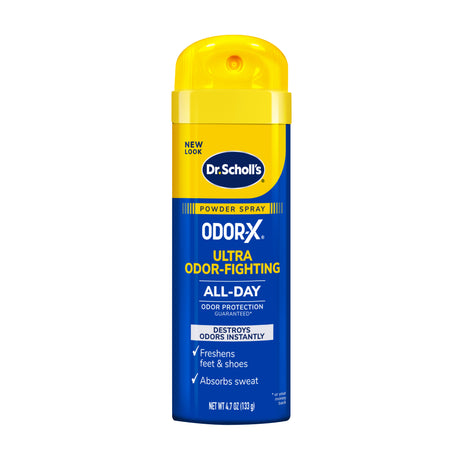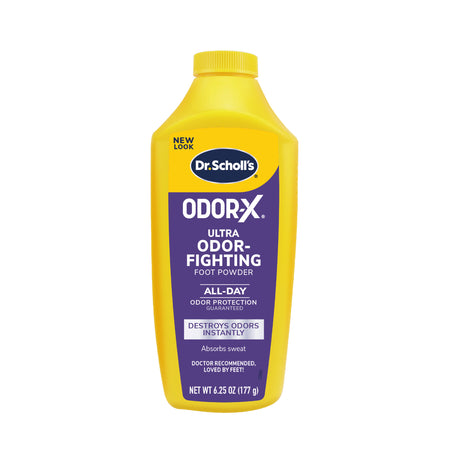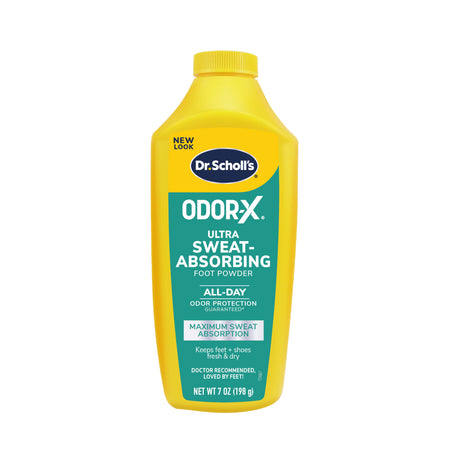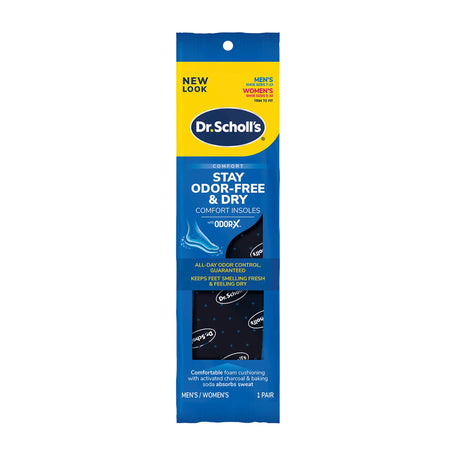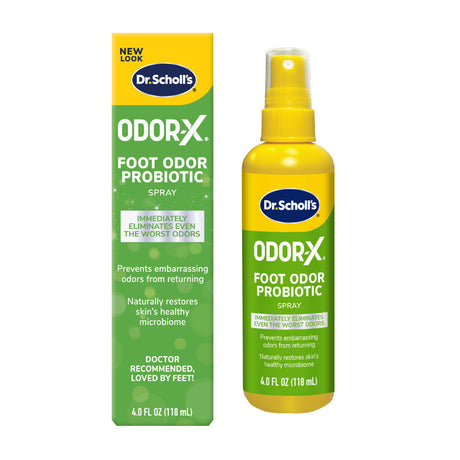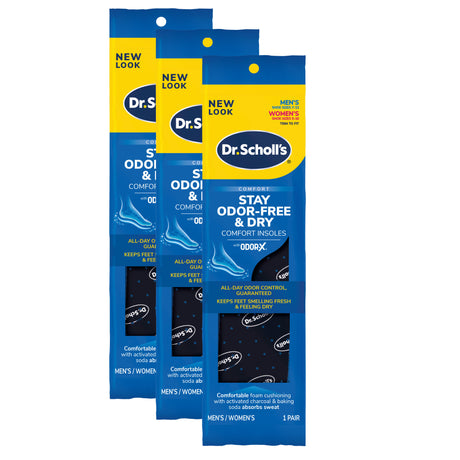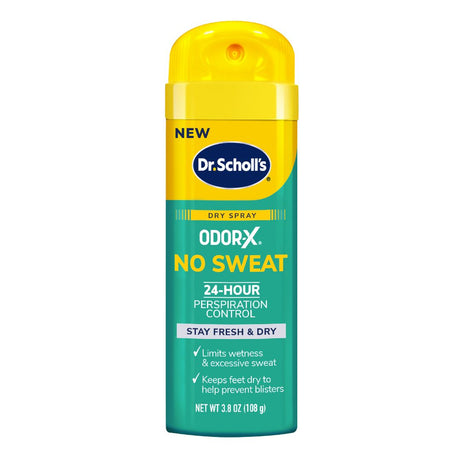Foot Odor & Sweat FAQs
Economy shipping is FREE for orders over $25+!
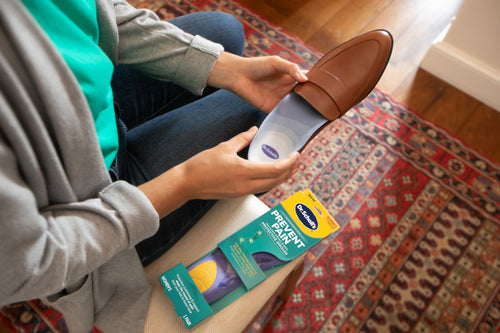
It may be challenging to get rid of foot odor entirely. However, there are a number of ways to reduce foot odor, including:
• Wash your feet thoroughly at least once a day. Consider washing them again each time they become dirty or sweaty. Use soap and a scrub brush to clean all surfaces of your feet, including between the toes and under toenails.
• Reduce hardened, dead skin, which can contribute to foot odor. Soak your feet in warm water for several minutes. Then, use a pumice stone or a foot file to buff away dead skin. Avoid removing too much dead skin in one sitting as this can cause irritation.
• Keep toenails trimmed and clean to reduce bacteria buildup, which can be a source of foot odor.
• Soak your feet in a mixture of water and Epsom salt or vinegar. Leave your feet to soak for about 15-20 minutes. You can do this once a week.
• Apply rubbing alcohol directly to your feet with a cotton ball. Rubbing alcohol kills the bacteria responsible for foot odor.
• Use a foot powder formulated to eliminate smelly feet. Dr. Scholl’s® Odor-X® Ultra Odor-Fighting Foot Powder instantly wipes out odors while keeping the feet dry and comfortable.
• Wash your shoes if the manufacturer indicates that it’s safe to do so. Many shoes can be hand washed or even laundered in a washing machine. If your shoes aren’t washable, you may be able to spot clean using sanitizing wipes or a disinfectant spray. Be sure to remove any insoles prior to washing and clean the insoles separately.
• If your foot odor is due to a fungal infection, such as athlete’s foot, treating the infection can help eliminate smelly feet. Dr. Scholl’s® Odor-X Athlete’s Foot Medicated Spray Powder can prevent and cure most cases of athlete’s foot. The formula also helps reduce foot odor.
The most common cause of foot odor (bromodosis) is sweat. Bacteria thrive in warm, moist conditions and they feed off sweat. When this happens, the bacteria produce an acid that has an unpleasant odor. Fungal organisms also thrive in these types of environments, so fungal infections, such as athlete’s foot and toenail fungus, can lead to foot odor. Poor foot hygiene, tight, closed-toe shoes and certain health conditions can also increase the risk of foot odor.
It’s often difficult to prevent foot odor entirely. However, there are steps you can take every day to help minimize smelly feet, including:
• Start each day with clean feet. Wash your feet thoroughly with soap. Dry your feet completely after your shower or bath and before you put on socks and shoes.
• Avoid wearing the same shoes two days in a row. Rotate your footwear, allowing shoes to air out for a full day before you wear them again.
• Change your socks at least once a day. Be sure to change them every time they become sweaty or smelly.
• Consider wearing odor-fighting insoles with your shoes. Stay Odor-Free & Dry Comfort Insoles with Odor-X® feature activated charcoal and baking soda to absorb wetness and neutralize odors. The insoles can be used with most styles of shoes.
• Use foot powder after you wash and dry your feet. Dr. Scholl’s® Odor-X® Ultra Odor-Fighting Spray Powder provides all day protection against foot odor. Spray on clean, dry feet every day, including between the toes. You can also use the spray on shoes for extra protection.
While it may not be possible to stop foot sweat entirely, there are treatments for people experiencing excessive sweating of the feet, including:
• Antiperspirants, which contain metallic salts, such as aluminum chloride hexahydrate, block pores and slow the production and flow of sweat. There are antiperspirants available over-the-counter. Stronger antiperspirant formulas are available with a prescription.
• Iontophoresis, a clinical procedure that involves placing the feet (or other body parts) in water and passing a gentle electrical current through the skin using a medical device.
• Botox injections, which involves shallow skin injections of OnabotulinumtoxinA, which can temporarily shut down the sweating process.
Ask your healthcare provider if treatments for excessive sweating are right for you.
There are a number of ways to reduce foot sweat, including:
• Wear shoes that have good ventilation. Avoid shoes that are too tight and don’t allow air to freely circulate. Opt for open-toed shoes whenever you can and consider going barefoot when indoors if it’s safe and comfortable to do so.
• Choose moisture-wicking socks. These types of socks draw sweat away from the skin and up to the surface so that it can evaporate more easily.
• Incorporate foot powder into your daily routine. Dr. Scholl’s® Odor-X Ultra Sweat-Absorbing Foot Powder is formulated for people who suffer from sweaty feet. The powder features six potent ingredients to fight odor and wetness, helping to keep the feet fresh and dry all day.
Sweaty feet can contribute to unpleasant odors as well as a number of issues, such as blisters and athlete’s foot. Foot powders, sprays and insoles containing baking soda, corn starch and activated charcoal can be very effective at reducing unpleasant smells. These products absorb odor-causing sweat and help neutralize existing odors to leave the feet feeling and smelling fresh. See your doctor if over-the-counter products aren’t enough to control foot odor. Certain conditions, such as athlete's foot and hyperhidrosis (excessive sweating), may require treatment in order to resolve the issue.
Dr. Scholl’s® offers several different products for foot odor control, including:
Because smelly feet are most often the result of excess moisture from sweat, it’s important to practice good foot hygiene and take steps to keep the feet dry. Bacteria and fungus thrive in moist, warm environments, increasing the risk of skin infections. Using foot products that absorb sweat and control odors can help promote healthy feet.
